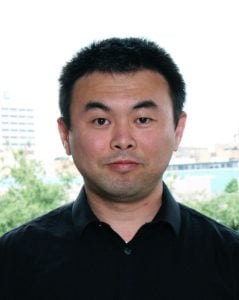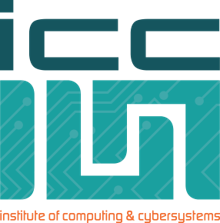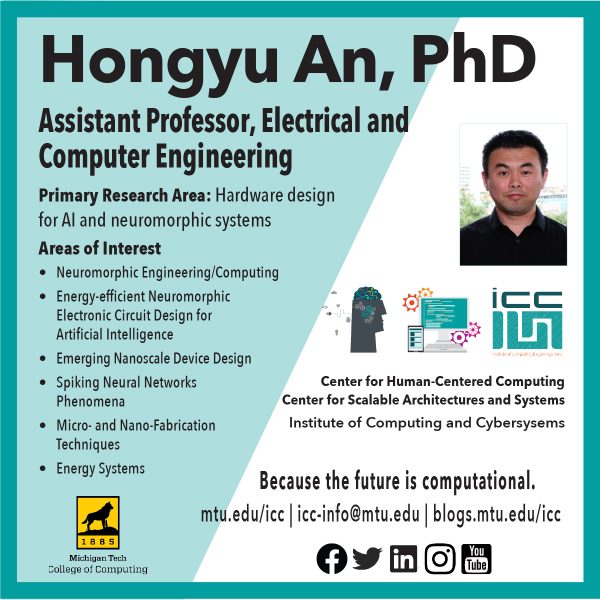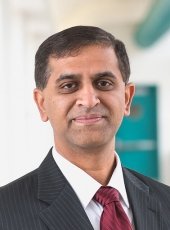by Karen S. Johnson, Communications Director, ICC
“A scientist should be a person who is always curious about nature and the world, and who tries to explore the unknown.” –Hongyu An, Assistant Professor, Electrical and Computer Engineering

Exploring science and technology is always exciting for new Assistant Professor Hongyu An, Electrical and Computer Engineering. He says he is “very pleased to have the chance to mentor the next generation and share my knowledge and experience with undergraduate and graduate students.”
Several things drew Hongyu An to Michigan Tech, including his observation that as an institution Michigan Tech cares about its employees. “The excellent professors, smart students, and the supportive environment are the main reasons I joined Michigan Tech,” he says. “As a new faculty member, I am facing a lot of new challenges. There is great support in my department (ECE) and through the ICC.”
Hongyu is a member of two Institute of Computing and Cybersystems (ICC) research centers: Human-Centered Computing and Scalable Architectures and Systems. He also sees synergies with the Center for Cyber-Physical Systems.
“It is my great pleasure and honor to be a member of the ICC,” Hongyu says. “ I can collaborate with the experts in HCC for exploring the brain and artificial intelligence, and the professors in SAS for hardware and architecture designs. Moreover, the neuromorphic chips I am working on can potentially be applied to Cyber-Physical Systems.”
Hongyu’s primary research area is hardware design for AI and neuromorphic systems. He believes that Artificial Intelligence is probably one of the most challenging research topics in science, noting that recent work in deep learning and artificial neural networks is demonstrating great progress in approaching artificial intelligence.
“But the traditional computers under von Neumann architecture cannot keep up with the development of neural networks and deep learning,” he cautions. “My research is addressing this challenge by using a new hardware design, from device to architecture levels.”
Hongyu’s teaching interests include VLSI, Circuits, and Electromagnetics. Desribing his teaching philosophy, he notes that making complicated things simple is more challenging than making simple things complicated, and that he strives for the former. This academic year, An is teaching EE 4271 VLSI Design and mentoring ECE master’s student, Sarvani Marthi Sarvani, whose project aims to design a silicon retina through CMOS and Memristors.
Hongyu and his research team are also investigating associative memory learning, a new learning method that aims to create a neuromorphic system that can learn from its surroundings directly.
“Associative memory is a widespread self-learning method in biological livings, which enables the nervoussystem to remember the relationship between two concurrent events,” Hongyu explains. “Through this learning method, dogs can learn the sound of bells as a sign of food; people can remember a word representing an object.”
“The significance of rebuilding associative memory at a behavioral level not only reveals a way of designing a brain-like, self-learning neuromorphic system, it is also to explore a method of comprehending the learning mechanism of a nervous system,” he adds.
And finally, beyond his work as a professor and scientist Hongyu hopes that he is “a good husband to my wife, a good father to my sons, and a good son to my parents.”
Hongyu completed his Ph.D. in electrical engineering at Virginia Tech, his M.S. in electrical engineering at Missouri University of Science and Technology, and his B.S. in electrical engineering at Shenyang University of Technology.
Recent Publications
An, Hongyu, Mohammad Shah Al-Mamun, Marius K. Orlowski, Lingjia Liu, and Yang Yi. “Robust Deep Reservoir Computing through Reliable Memristor with Improved Heat Dissipation Capability. IEEE Transactions on Computer-Aided Design of Integrated Circuits and Systems (2020).
An, Hongyu, Qiyuan An, and Yang Yi. “Realizing Behavior Level Associative Memory Learning Through Three-Dimensional Memristor-Based Neuromorphic Circuits. IEEE Transactions on Emerging Topics in Computational Intelligence (2019).

Founded in 2015, the Institute of Computing and Cybersystems (ICC) promotes collaborative, cross-disciplinary research and learning experiences in the areas of computing education, cyber-physical systems, cybersecurity, data sciences, human-centered computing, and scalable architectures and systems, for the benefit of Michigan Technological University and society at large.
The ICC creates and supports an arena in which faculty and students work collaboratively across organizational boundaries in an environment that mirrors contemporary technological innovation. The ICC’s 55 members represent more than 20 academic disciplines at Michigan Tech.

